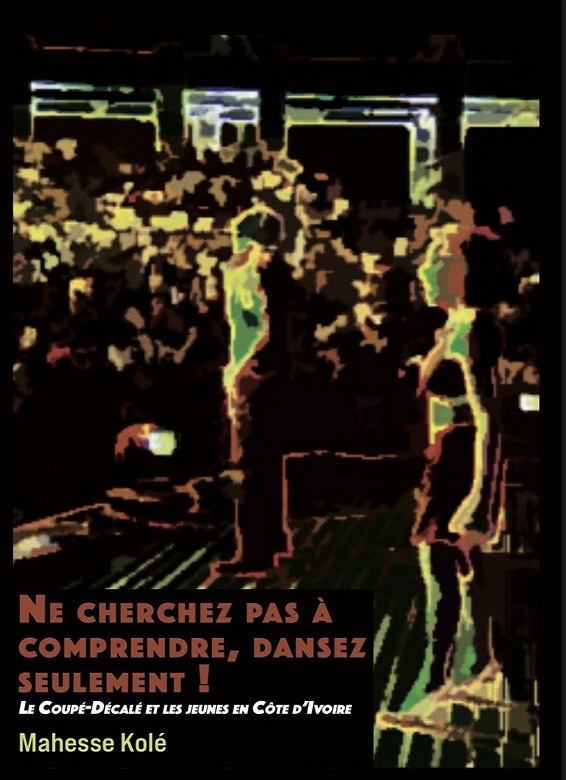written by Mahesse Kolé
Le Coupé-Décalé et les jeunes en Côte d’Ivoire
Au moment où la Côte d’Ivoire connaît une crise militaro-politique et est coupée en deux (2002), le Coupé- Décalé apparaît comme une véritable innovation dans l’univers musical ivoirien. Il fait “ sensation” avec des pratiques culturelles, un code vestimentaire, des concepts chorégraphiques et des formes musicales atypiques à l’époque. Pendant que les genres préexistants notamment le Reggae, le Hip Hop et le Zouglou se positionnent comme des musiques “engagées”, le Coupé-Décalé, quant à lui, s’inscrit dans un tout autre registre : celui d’apporter de la joie, de mettre de l’ambiance, d’oublier la triste réalité de cette période difficile. Près de deux décennies plus tard, le Coupé-Décalé continue de jouir d’une grande popularité auprès d’une communauté de fans sensibles à l’idéologie promue et aux pratiques sociales qui en découlent.
Cette étude développe une réflexion sur le Coupé-Décalé, une forme de médiation culturelle qui consolide une identité sous-culturelle. Elle veut d’abord montrer les représentations imagées et imaginées de la sous- culture jeune à travers les contenus musicaux, ensuite examiner les acteurs, pratiques et interactions qui conduisent à l’élaboration de l’œuvre musicale, et enfin, démontrer en quoi le public et les producteurs, à travers la réception de la musique et l’identification au Coupé-Décalé, constituent une sous-culture. En définitive, le Coupé-Décalé constitue une identité sous-culturelle. Il précise un nouveau rapport au politique, aux normes sociales et surtout une quête vers le plaisir, l’enjaillement et l’amusement.
=============
At a time when Côte d’Ivoire was experiencing a military-political crisis and was split in two (2002), the Coupé-Décalé appeared as a real innovation in the Ivorian musical universe. It caused a “sensation” with cultural practices, a dress code, choreographic concepts and musical forms that were atypical of the time. While pre-existing genres, such as Reggae, Hip Hop and Zuglou, are positioned as “committed” music, Coupé-Décalé, on the other hand, is in a completely different register: that of bringing joy, setting the mood, forgetting the sad reality of this difficult period. Nearly two decades later, the Coupé-Décalé continues to enjoy great popularity among a community of fans who are sensitive to the ideology promoted and the social practices that derive from it. This study develops a reflection on the Coupé-Décalé, a form of cultural mediation that consolidates a subcultural identity. It aims first to show the pictorial and imagined representations of the youth subculture through musical content, then to examine the actors, practices and interactions that lead to the development of the musical work, and finally, to demonstrate how the public and the producers, through the reception of the music and the identification with the Coupé-Décalé, constitute a subculture. In short, the Coupé-Décalé is a subcultural identity. It specifies a new relationship to politics, to social norms and, above all, a quest for pleasure, endangerment and amusement.


| ISBN | 9789956553679 |
| Pages | 258 |
| Dimensions | 229 x 152 mm |
| Published | 2023 |
| Publisher | Langaa RPCIG, Cameroon |
| Format | Paperback |



2 comments
“Distancing herself from previous historical studies on urban popular music in general and the Coupé-Décalé movement in particular, the author examines the ethos that runs through this movement as the foundation of this subculture. Collected in a remarkable coherence between the research questions, the research objectives, the theoretical framework and the collection tools, the data allowed the author to show that despite the premature death that was predicted – wrongly – the Coupé-Décalé has established itself, over the years, as an essential reference in Ivorian and even African urban music.”
Dr. Kra Walter, Associate Professor, Alassane Ouattara University, Bouaké
“Through long-term, demanding, meticulously executed ethnographic fieldwork, she ventured into the complex mysteries of the young subculture of the Coupé-Décalé. In doing so, the author guides us on a broader and much more complex itinerary of urban popular culture in Abidjan, if not in Côte d’Ivoire.”
Aghi Bahi, Professor of Anthropology of Communication Félix Houphouët-Boigny University, Abidjan